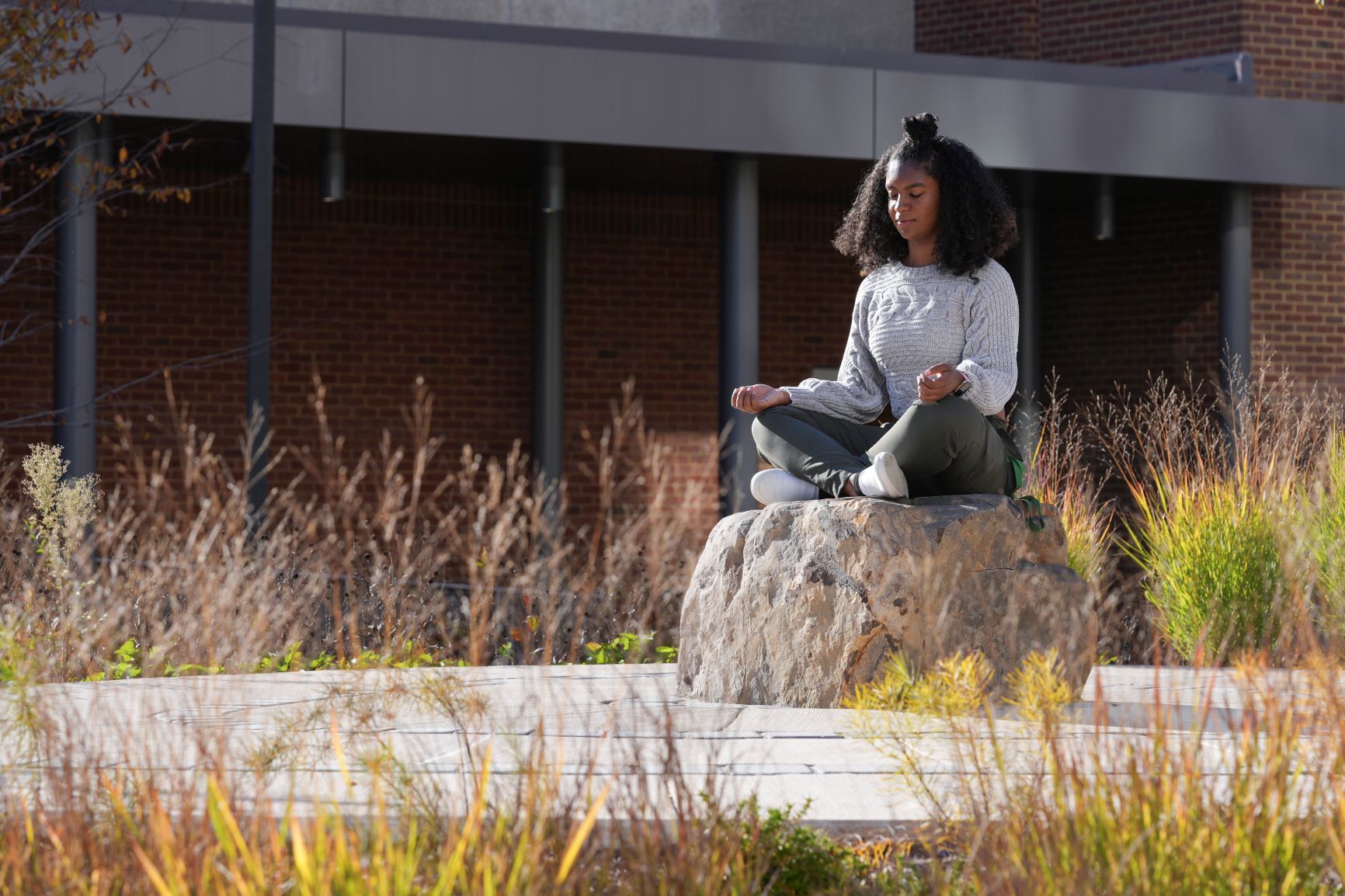
Mindful Mason Moments will be on hiatus for the Spring 2024 semester. However, you can enjoy mindfulness sessions through our Koru Mindfulness cohorts. Learn about Koru Mindfulness here.
Take a well-being break on weekdays for Mindful Mason Moments mindfulness sessions. Facilitators hold space for you to slow down and reconnect with yourself, so you can move through your day with more awareness, connection, and ease. By taking good care of yourself, you can contribute more to your friends, families, colleagues, and community members. These opportunities give you the extra push to build an actual break into your day that is focused on self-care.
Well-Being Benefits of Mindfulness
Research shows that practicing mindfulness meditation can lead to many significant well-being benefits. Those benefits include:
- Less stress, anxiety, and symptoms of depression
- More resilience, concentration, and peace
- Improved physical health
- Greater academic success and job satisfaction
These drop-in sessions are meant to encourage and guide you. They will not give you a full introduction to mindfulness practices or meditation. They will not cover any particular curriculum from start to finish. However, a benefit is that if you miss a session, you can jump right into the next one. This drop-in approach does require flexibility on your part to experience different practices from one session to the next. Sessions may include meditation, gentle movement, sound, silence, or breath work.
“When we get too caught up in the busyness of the world, we lose connection with one another – and ourselves.” – Jack Kornfield
Facilitator Bios
 Katie Clare is Associate Director for Resilience Programs at Mason. She oversees the Resilience Badge and also collaborates with the Mason Chooses Kindness initiative. Through graduate school, marriage, and parenthood, Katie has leaned on mindfulness and meditation to remain focused and to engage her body and mind awareness. She developed a silent meditation practice through Don Gallehr’s informal training. Her practices benefited from formal training with Tara Brach, Anand Mehrotra, Karen Maezen Miller, Mark Thurston, and Mary Elizabeth Lynch. She has attended the Summer Institute for Educators with the Greater Good Science Center, the Summer Session on Contemplative Practices with the Association for Contemplative Mind in Higher Education, and Mindfulness Fundamentals through Mindful Schools. Trained as a Mental Health First Aid facilitator through the National Council for Behavioral Health, she brings self-care and mindfulness into the mental health conversation. Her Mindful Mason Moments sessions often include guided meditation and breath work.
Katie Clare is Associate Director for Resilience Programs at Mason. She oversees the Resilience Badge and also collaborates with the Mason Chooses Kindness initiative. Through graduate school, marriage, and parenthood, Katie has leaned on mindfulness and meditation to remain focused and to engage her body and mind awareness. She developed a silent meditation practice through Don Gallehr’s informal training. Her practices benefited from formal training with Tara Brach, Anand Mehrotra, Karen Maezen Miller, Mark Thurston, and Mary Elizabeth Lynch. She has attended the Summer Institute for Educators with the Greater Good Science Center, the Summer Session on Contemplative Practices with the Association for Contemplative Mind in Higher Education, and Mindfulness Fundamentals through Mindful Schools. Trained as a Mental Health First Aid facilitator through the National Council for Behavioral Health, she brings self-care and mindfulness into the mental health conversation. Her Mindful Mason Moments sessions often include guided meditation and breath work.
 Julia Morelli is President of the George Mason University Instructional Foundation, Inc. Her passion for the internal arts began many years ago after training with the Center for Mind-Body Medicine, and taking yoga and qigong classes through Peaceable Dragon. She incorporates practices learned through Health Advantage Yoga (RYT 200), the Strozzi Institute/Embodied Leadership, and the Institute for Zen Leadership. She considers it an honor to work with those who seek to develop and enhance the physical, emotional, and spiritual condition. Julia’s sessions focus on conscious breathing and gentle movements to improve flexibility, decrease stress, cultivate chi/ki/qi (universal energy), and enhance somatic (body) awareness. Her understanding of the importance and power of self-awareness and compassion deepened through the work done with her horse, Dahnaan, who had been abused and became one of her greatest teachers.
Julia Morelli is President of the George Mason University Instructional Foundation, Inc. Her passion for the internal arts began many years ago after training with the Center for Mind-Body Medicine, and taking yoga and qigong classes through Peaceable Dragon. She incorporates practices learned through Health Advantage Yoga (RYT 200), the Strozzi Institute/Embodied Leadership, and the Institute for Zen Leadership. She considers it an honor to work with those who seek to develop and enhance the physical, emotional, and spiritual condition. Julia’s sessions focus on conscious breathing and gentle movements to improve flexibility, decrease stress, cultivate chi/ki/qi (universal energy), and enhance somatic (body) awareness. Her understanding of the importance and power of self-awareness and compassion deepened through the work done with her horse, Dahnaan, who had been abused and became one of her greatest teachers.

Jana Abutayeh is an undergraduate student studying psychology and well-being at Mason. She finds great opportunities from taking a holistic approach to health, with a focus on the mind-body-spirit connection that can be strengthened with mindfulness practices such as meditation and yoga. Jana’s primary passion is using sound as a tool for healing. She is working toward becoming a sound bath facilitator, often using crystal singing bowls to help guide people through the meditative experience.
Participant Testimonials
Here’s what some participants have to say about Mindful Mason Moments sessions:
“I have loved coming to these sessions, especially the mindful movement ones. It is super helpful for grounding as it is a perfect combination of connecting with silence as well as connecting with the body.”
“These are the go-to sessions throughout the semester. Awesome community, unique, distinct practices by wonderful facilitators! It’s always just what I needed at that time. It’s super refreshing and is a good change of space from the regular tasks.”
“Mindful Mason Moments allows me the time and space to take a pause and re-center myself in the middle of everything. I’m especially grateful for these opportunities now, when all the work-home boundaries are blurred.”
“I started attending because I was (and still am) going through some stressful times at home and thought that learning to meditate could only help. It did. That is a big reason why I continue to come back. But another reason that is just as big for why I keep attending is the friends I have made and the warmth and care that I get from them.”
“My mind moves a mile a minute and slowing down is not something I do easily. Having a structure and space to help me practice mindfulness has been helpful and something I want to do more often. I am grateful for this program that helps me to become more present and mindful.”
